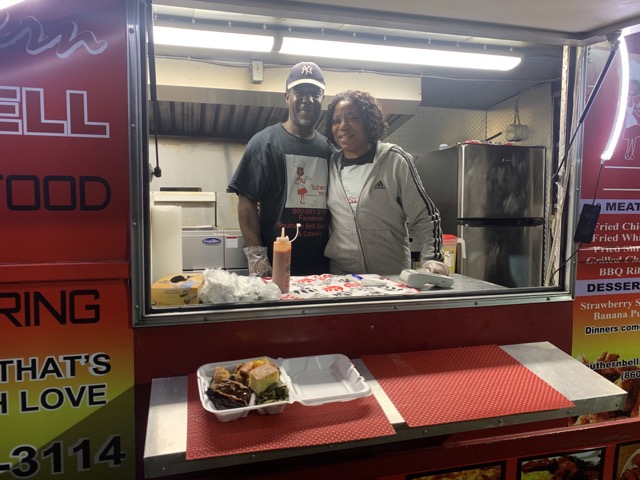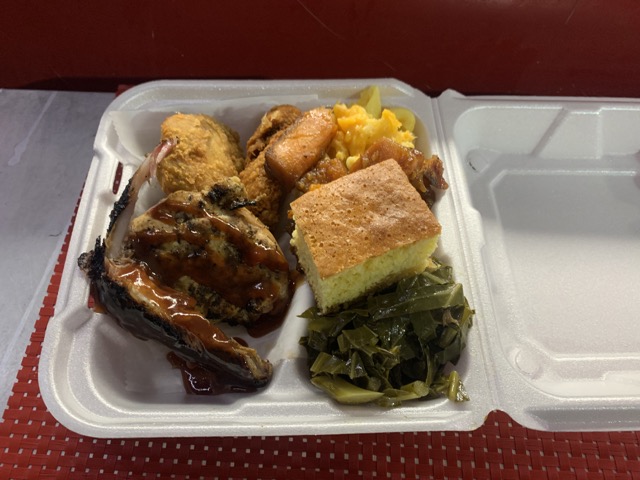
c/o Lewis Woloch
When I first caught a glimpse of the Southern Bell Soul Food Truck sitting a few spots behind our notorious Mamoun’s Falafel, I was struck with a wave of excitement. Was this truck new? Does Mamoun’s have some more competition? Turns out, Southern Bell has been around for a few years now, already making its mark on the Wesleyan campus with home-cooked Southern delights like fried chicken, yams and collard greens, and even some killer BBQ ribs.
Owned and operated by the husband-wife team Fred and Tomorra Williams, this up-and-coming weekend dining option offers a personal, homestyle eating experience that will leave your belly full and your taste buds tingling. The truck’s offerings aren’t the most conventional college-campus late-night cravings, but the love, passion, and tradition that seeps into every bite of Southern Bell’s food makes it a noteworthy choice for any student looking for a hearty meal at any time of night.
On an unseasonably warm Saturday night a few weeks ago, I stood at the window of the Southern Bell Food Truck and chatted with Fred and Tomorra about the background of their food, their business model, and the reasons why they came to Wesleyan. The two of them have been in the catering business for eight years doing various gigs around Connecticut, and before Wesleyan their primary stomping grounds were at the stadium of the Hartford Yard Goats, a minor league baseball team.
They found out about the lucrative opportunity of parking their truck on the Wesleyan campus three years ago through executive assistant to the Vice President for Communications Evelyn Bozeman, and immediately set their sights on acquiring the necessary licensing to operate in Middletown. It was the perfect opportunity since baseball slows down in the fall, right when students start coming back to school.
“We did a catering, and then we tried it here one night [on the truck], and it was fabulous,” Tomorra said.
The food itself is what makes Southern Bell such an exciting experience, giving students a taste of genuine home cooking that might be harder to find at other campus dining options. To streamline the serving process on their truck, most sides are cooked at their certified kitchen in Hartford and kept warm on the truck, as is the case with their smoked ribs and grilled chicken. That way, Tomorra can get the food out faster to hungry students. But rest assured, there’s no loss of quality.
When I tried the soul food sampler that Fred and Tomorra graciously plated for me a few weeks ago, everything tasted like it had just come out of the oven. The fried chicken wings, fried on the truck, were crispy and seasoned to perfection, while the juicy pork rib I scarfed down left my mouth aching for more. Fred insisted that I combine, in one bite, a piece of fried chicken (topped with hot sauce, of course) with yam and some collard greens. I obliged and also created a few more combinations of my own. The cornbread was perfect with a tender piece of BBQ chicken, while the mac and cheese was taken to the next level after being mixed with some collard greens (broth included).
Many recipes come from Tomorra’s grandmother, including their famous yams. It turns out my use of the collard green juice is right on par with the eating expectations of the owners; they explained to me how sometimes people order mac and cheese with a side of yam juice! The lovely sweet potatoes have even been known to engulf and mystify taste buds.
“One of the owners of the Yard Goats told me ‘I hate when those [yams] come on my plate at Thanksgiving, but yours, I have to give you kudos…. I actually love yours,’” Tomorra said.
Fred and Tomorra have their personal favorites. Fred, in line with his suggestion of combining the different items, likes the combination of mac and cheese, yams, and fried fish. Tomorra’s favorite, on the other hand, are the ribs, which she was eager to tell me are “jerked,” or smoked with jerk seasoning.

c/o Lewis Woloch
“There’s so many different cultures,” she said. “I use Jamaican seasoning for the jerk, I have so much Goya. For seasoning, you can pull from every different culture.”
To appeal to the vegans and vegetarians of Wesleyan, Tomorra has recently tried to incorporate some new dishes like a vegan eggplant lasagna onto the menu, and she claims that it is helping in an overall push to cook healthier. However, there are only so many changes that they can make without upsetting their most loyal customers.
“Every time I change [the menu], and they come here, people are like, ‘Well we’re not looking for that, we’re looking for soul food,’” Tomorra said.
It’s obviously a task that requires striking a balance, but Fred and Tomorra are both here for it. They were keen to reiterate throughout our conversation how grateful they are for the position they now find themselves in on Wesleyan’s campus. They love all of the interactions they’re able to have with students.
“The love is here too,” Fred said. “The students, they tell us all the time, ‘Thank you for being here.’”
It’s clear that the two of them adore what they do for a living, which infuses their food with a special type of love that brings it to the next level. The couple has been together for 25 years, and the truck is just another segment of their journey together.
“We relax, we watch football on Sundays,” Tomorra said. “This is our life.”
Unfortunately, there have been times for the two food truck owners when things haven’t been as seamless or easygoing. Fred explained how, in the past, they’ve found it harder to establish themselves, whether it be in catering scenarios, at events, or just going with the truck.
“We’re a small Black-owned business, so a lot of times, people will try to criticize you for anything…but being [at Wesleyan] was the best thing that happened for us,” Fred said.
The graciousness that Fred and Tomorra have for their current situation manifests itself in their desire to give back to the community. They want to help out disadvantaged students at Wesleyan, whether that be by providing someone with a job on the truck or simply finding a way to give out the leftover food they have every night. The latter goal extends to Middletown residents too.
They are also looking for someone to create a website for them; Tomorra has already jumpstarted social media accounts on Instagram and Facebook but knows that she could use a second pair of eyes (or fingers!) when it comes to curating the type of media presence Southern Bell wants to have online. Fred also stressed the power of social media for their brand.
“It’s definitely a chain reaction,” he said. “One person posts the food, and a person will get it and share it 17 times.”
With regard to Southern Bell’s goals for the future, the truck itself will be sticking around for a while more.
“I’m not sure if I’m ready to handle the monster of a restaurant,” Tomorra said. “So, this pretty much is my gig.”
Ultimately, what the husband-wife team hopes to achieve is creating their own line of frozen food one day. This reflects their charitable goals, since one of the draws of having their own products in grocery stores is that people on snap benefits or food stamps would be able access to their delicious food. As Fred put it in a text message to me a few days after our interview, a frozen food line would make it so anyone could enjoy Southern Bell Soul Food in the comfort of their own home.
As we finished the interview and I was getting ready to walk home with a container of chicken wings in hand, one of the cooks from Dope Fried Chicken came over to chat with Fred and Tomorra. They cracked a joke or two about the “man in front” (the falafel truck) and then chatted about how business had been of late. When I introduced myself as a reporter for the student newspaper, the cook was quick to endorse Southern Bell’s food, saying how he loved the mac and cheese. He also reaffirmed that Fred and Tomorra are wonderful people, which was just another example of the amazing culture that reverberates around the Southern Bell Soul Food truck. When the competition from down the street is pouring on praise, you know they must be doing something right.
Lewis Woloch can be reached lwoloch@wesleyan.edu.